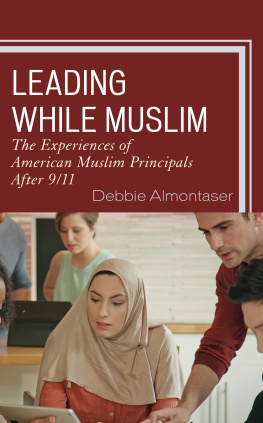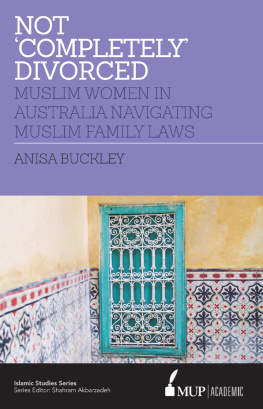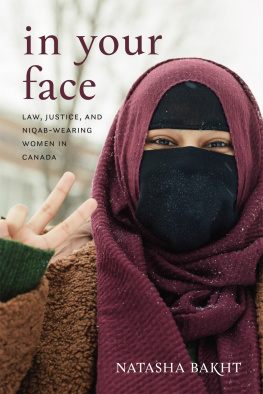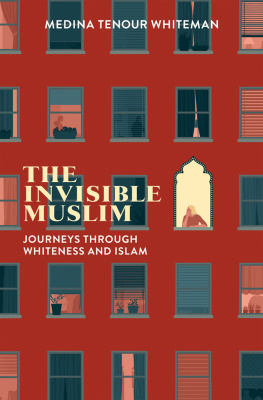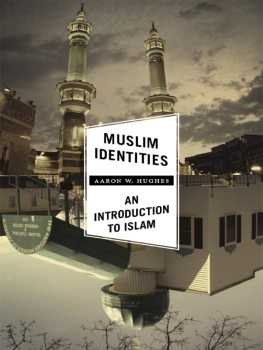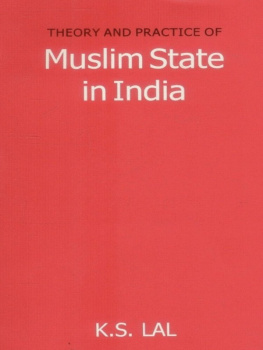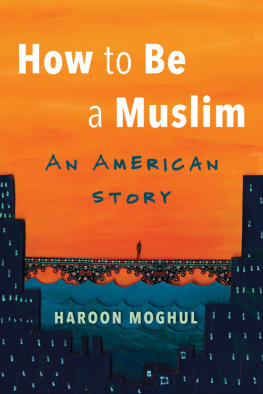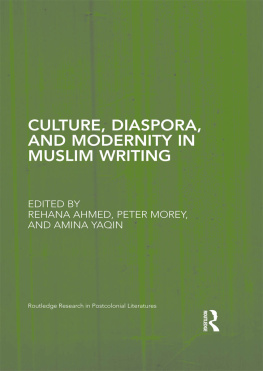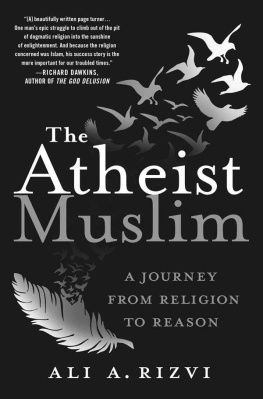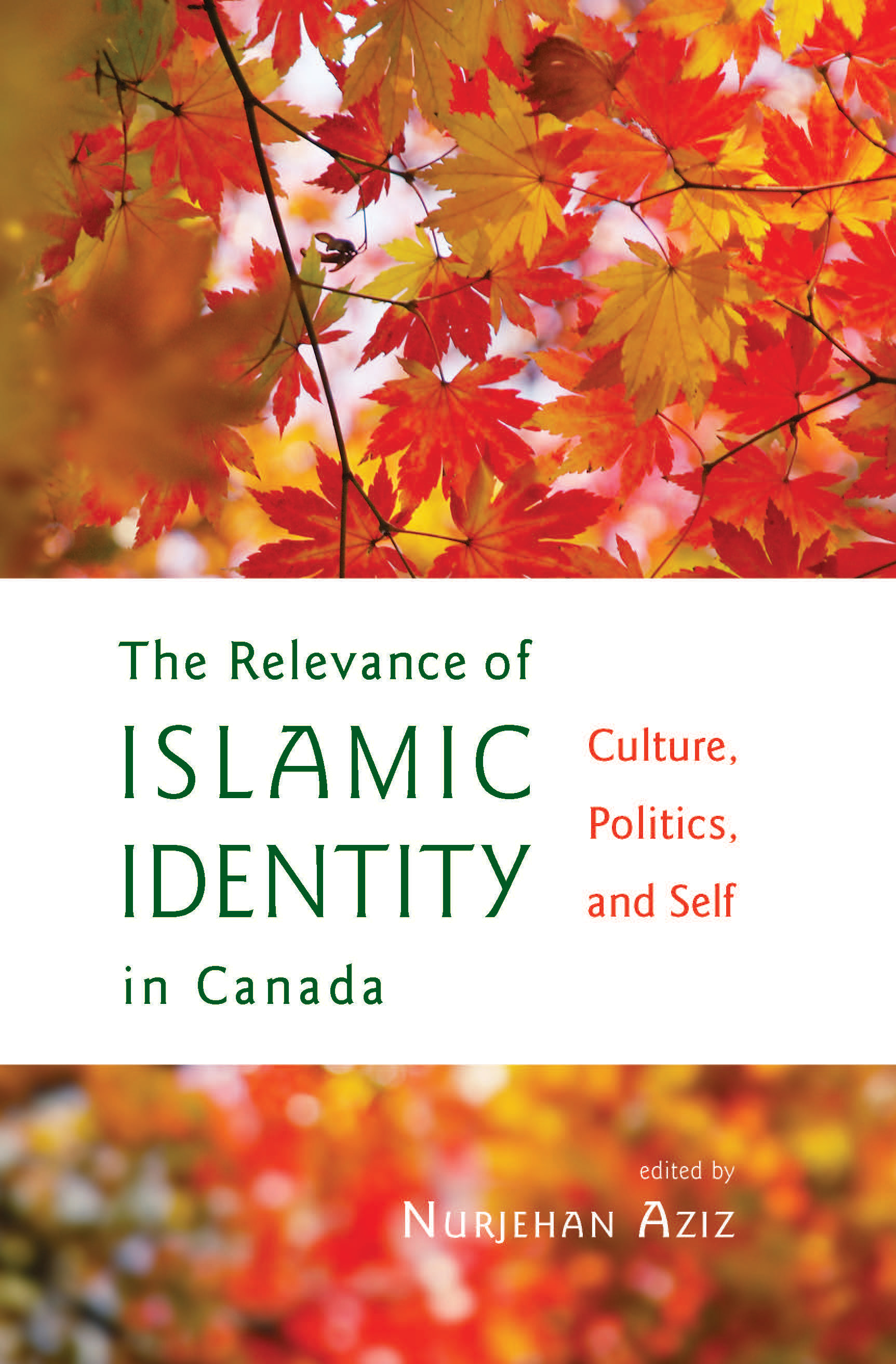
THE RELEVANCE OF
ISLAMIC IDENTITY
IN CANADA
Culture, Politics, and Self
edited by
Nurjehan Aziz
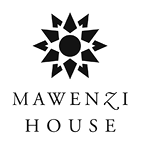
2015 The Authors
Preface Copyright Nurjehan Aziz
Except for purposes of review, no part of this book may be reproduced in any form without prior permission of the publisher.
We acknowledge the support of the Canada Council for the Arts for our publishing program. We also acknowledge support from the Government of Ontario through the Ontario Arts Council.


Cover design by Peggy Stockdale
Cataloguing data available from Library and Archives Canada
ISBN: 978-1-927494-76-9 (html)
Mawenzi House Publishers Ltd.
39 Woburn Avenue (B)
Toronto, Ontario M5M 1K5
Canada
www.mawenzihouse.com
Contents
Safia Fazlul
Ameen Merchant
Narendra Pachkhd
Reexamining Relations
Between Men and Women:
Monia Mazigh
Anti-Muslim Bigotry Goes Official
Canadas Newest Dark Chapter
Haroon Siddiqui
Karim H Karim
Who I Really Am: Communicating Islam
Across Generations
Asma Sayed
Mayank Bhatt
Zainub Verjee
Ihsaan Gardee & Amira El-ghawaby
Mohamed Abualy Alibhai
Preface
Theres a story about the great Urdu poet Mirza Ghalib (1797-1869). One evening during the time of the so-called Indian Mutiny, while on the road in Delhi he was stopped by British soldiers. Are you a Muslim? they asked. To which he replied, Only half a Muslim. I drink wine but I dont eat pork. One might wish to draw a line between those precarious times and ours; or wonder if the answer would not draw a fatwa in parts of the world today. But that question, and its answer, neatly illustrate the concerns with which we conceived this volume. So much has been written recently about Islam and Muslims, that we felt that a fundamental question needed illumination: What does it mean to be a Muslim? Is it a public or a private identity, and as an identity does it make sense in a secular democracy such as Canada? What relation does it bear to historical, cultural, and ethnic identities? Is a total agnostic or an atheist a Muslim? Is a person who disavows being a Muslim still a Muslim?
The book, then, began as an exploration, and perhaps a nave one. Not all our questions were answered, and we learned. The responses have been illuminating, thought-provoking, and also disturbing. To some, the question we posed does not even arise; Muslims is what they are. To others its an irritant: when Ameen Merchant was posed the question, Are you a Muslim? over the phone, his immediate response, he tells us, was No. But later he began to try to understand that response. To some, Muslimness is imposed from without, or its one of several identities, or its an identity that has only been recently awakened after 9/11 during the so-called war on terror; or its something beautiful and personal. The responses to our questions have come from perspectives that are personal, historical, cultural, political, and philosophical. The question of reinterpreting or rereading the scriptures arose. While examining Tariq Ramadans proposals for radical reform, Mohamed Alibhai asks, is it time for thinking the unthinkable, for abandoning the idea of verbal revelation itself?
To our great surprise, however, one observation was almost universal: recently in Canada Muslims have found themselves the objects of vilification and discrimination. Being a Muslim then means being a victim. The niqab controversy in Canada appeared to be an almost hysterical culmination of this victimization and misunderstanding, when the Federal Court of Canada had to uphold a Muslim womans rights, while physical attacks on Muslims accompanied verbal abuse and slander of their faith, bringing to some an eerie reminder of the vilification and finger-pointing of visible minorities elsewhere at other times in the name of security. But we live in a democracy, for every ignorant and bigoted demagogue there are many examples of true democrats. But if the attacks are not with macheteswe live in Canada, after allthey are still damaging. This is a historical juncture at which, whether we intended to or not (we didnt), these dispiriting observations from diverse perspectives will bear witness to what Haroon Siddiqui in these pages calls Canadas newest dark chapter.
An Incompetent Muslim
Safia Fazlul
Theres no shortage of peculiar sights when walking down Yonge Street from the Eaton Centre to the Toronto Reference Library, but theres always one that never fails to make me smirk to myself. A five-minute walk from Wellesley Station is the Toronto Islamic Centre, right beside Seductions, one of North Americas largest adult department stores with scantily clad mannequins coquetting at the window display.
Anyone with even a minimal understanding of Islamic views on modesty and sexuality would understand the irony behind this juxtaposition. I see humour in the irony, but also, more importantly, I see this small display as representative of the general live-and-let-live attitude of non-Muslim Canadians towards conservative Islamic culture, and of conservative Canadian Muslims towards liberal mainstream cultureat least when the delineation between the two is bold and clear.
The Toronto Islamic Centre occupies a small, obscure office on the second floor of a bubble-tea cafe, tucked away behind bars, eateries, clothing stores, and other manifestations of materialism and decadence. It is not a threat; its just a benign representative of a culture that rightfully belongs on the cultural mosaic, an ideal of our society promoted by the Canadian government itself.
But imagine now the Toronto Islamic Centre as a ten-storey building with posters on its windows saying Make Eid a National Holiday or, more boldly, a neon sign proclaiming, All Homosexuals Will Go To Hellwhat would happen to that laissez-faire attitude? Would years of bottled frustrations kept behind the faade of Canadian politeness burst into the public sphere?
And imagine the mannequins at the Seductions storefront wearing lingerie and hijabs to mock the garments of traditional Muslim womenwould those Muslims who secretly detest liberal Canadian ideals finally take their opinions to the streets? Might there even be a violent outburst from the few fundamentalists?
The reason why any tension between traditional Muslims and liberal Canadians is lukewarm is because the two exist side by side with the unspoken rule of never spilling into each other. When the two streams try to make inroads into each other the tension becomes heated and the myth of the cultural mosaic as an inclusive policy unravels itself. Discrimination, although usually subtle and so politely delivered it is difficult to detect, rears its ugly head.
Take the hijab, niqab, and burqa for example. There is no uproar from Canadians about these garments being worn by Muslim Canadian women in their homes, at work or in school because they are a clear symbol of belonging to a subcategory of Canadian. To deny the right to wear the symbolic garments would mean to attack the multicultural ideals that shape Canada. However, when these attires are worn in the public spaces where the dominant culture feels insecure or threatened, hostility rears its head: lets not forget the 2011 banning of the niqab in citizenship ceremonies (recently lifted) or the Parti Qubcoiss unsuccessful attempt to ban hijabs and other religious symbols in Quebecs public service in 2013.


